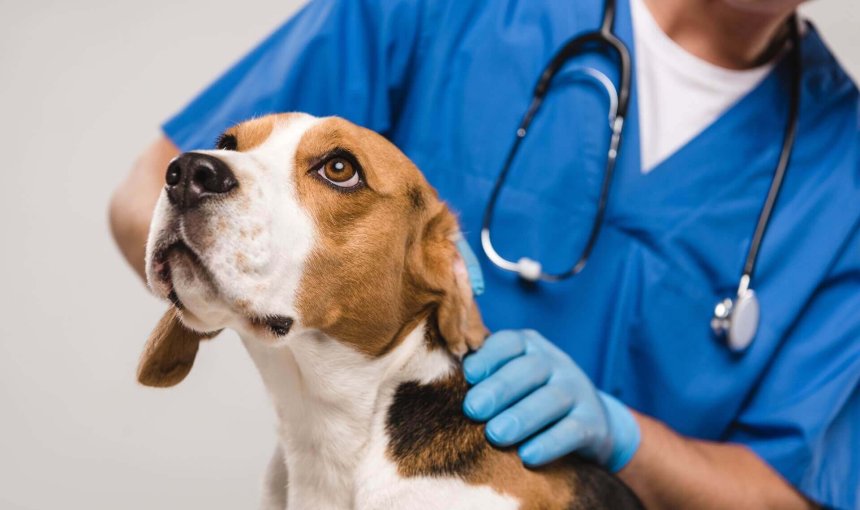How Often Should I Take My Dog To The Vet?
When it comes to your dog's preventative health care, regularity matters. Discover why you should take your dog to the vet at least once a year (and maybe more) in this post.

Our furry friends can’t exactly tell us, or always show us, when something is wrong. So if you’re wondering – how often should I take my dog to the vet? – you’re not alone. Here’s all you need to know – plus where a GPS tracker with Health Monitoring can help you spot the signs of illness in dogs early.
Key Takeaways
Regardless of age, dogs should visit the vet at least once a year for a comprehensive health assessment, vaccinations, and early detection of potential issues.
Keep an eye out for potential red flags like decreased activity, changes in sleep patterns, or altered eating habits. These might signal health issues that your vet is best off checking early.
The Tractive smart dog tracker includes Health Monitoring features to track your dog’s activity, sleep patterns, and even vital signs. A change in these patterns means you’ll get a Health Alert – prompting you to take them over for a checkup.

Always know your buddy is healthy & safe
Read more- Key Takeaways
- How often should I take my dog to the vet?
- Why should I take my dog to the vet yearly?
- What to expect at your dog’s annual checkup
- My dog is a puppy. Should I still only take them once a year?
- How often should I take my senior dog to the vet?
- When else should I take my dog to the vet?
- What other ways can you catch health issues in dogs early?
- Act sooner over later – and keep your buddy healthy for a lifetime
How often should I take my dog to the vet?
In short, you should take your dog to the vet at least once a year for an annual checkup. Hopefully, you’re able to for a yearly checkup for your own health. The same goes for pets. Doing so gives you a picture of what’s going right, what might be on the edge of going wrong – so you can catch issues early.
💡Some of the earliest signs your dog might not be feeling well is if they’re less active or playful than usual – or are sleeping poorly. Both of which a GPS and Health tracker for dogs can help you pick up on early. So you can head over to your vet for a checkup before any illness has a chance to worsen.

Get health alerts for your dog
Our pups can’t always tell us if something’s wrong. But if their tracker detects unusual changes in their routine, you’ll get an alert, helping you catch potential issues early.
Why should I take my dog to the vet yearly?
According to the Brandywine Valley SPCA, dogs who are at least one year old should go to the vet yearly for general physical checkups. During these visits, they can also get updated booster shots. Prevention is a ton cheaper than cure and you’re always better off being prepared. Going to the vet at least once a year means detecting and preventing any health issues before they have a chance to worsen.
What to expect at your dog’s annual checkup
Over the course of the checkup, you will probably be asked general questions about your dog’s health, such as:
- How often they eat
- If they’re going to toilet regularly,
- If they get enough exercise
To prepare for your visit, take note of anything that seems off in the week(s) before. For example – if your dog’s sleeping patterns have recently changed, they’re eating less than usual, or drinking more. All of these could be potential red flags for your dog’s health.
At routine checkups, you’ll also have the chance to ask the vet any questions you might have. Some people are nervous about asking questions which may seem dumb or obvious – don’t worry! They’ve heard everything before; and this is your pup’s life we’re talking about here. Don’t let your pride get in the way of caring for your furry friend.
Your vet will check your dog’s weight and general appearance (such their posture and skin). They’ll check eyes, ears, nose – basically all the things that humans get checked for during our annual checkups.
Finally, your vet will also check to see if your dog’s booster shots are all up to date. And if there’s anything else to prescribe (like deworming medicine).
My dog is a puppy. Should I still only take them once a year?
No! Recommendations vary depending on breed, but generally you should take your puppy to the vet about once a month. There is a lot to check and ensure, and you do not want to risk anything important being missed. Since dogs grow much faster than humans, they rapidly will age out of being puppies. Which means they very quickly will need vaccinations. Plus, because their bodies change so quickly, this makes sure that everything is growing and shaping how it should.
How often should I take my senior dog to the vet?
When your dog starts to get older, it can be concerning. While slowing down is natural in any animal – or human, for that matter – as they get older, there are always new challenges which are associated with age. To make sure that everything is still going smoothly, and no undetected issues are cropping up, it is generally recommended to take your senior dogs to the vet at least twice a year, for something like once every six months.
When else should I take my dog to the vet?
If you notice something change in your dog’s behavior or appearance, and that change does not revert after an extended period, you should probably get it checked out. While you don’t need to run to the vet every time they have a particularly loud sneeze, you also don’t want to ignore serious signs. While some of them can be rather obvious – a broken leg, refusal to eat food, blood in the stool for an extended period of time – the less obvious symptoms can be harder to see, as they can’t exactly say, “Hey, my stomach hurts!”
The American Kennel Club points out two symptoms that you may not think are particularly concerning – scooting on the floor and weight loss, the latter of which may not be very obvious. These can actually be signs of worms, UTIs, or other significant issues.
What other ways can you catch health issues in dogs early?
All too often, your dog is more likely to soldier through any pain or discomfort like a trooper than complain. Meaning, by the time you’ve noticed, their health might’ve worsened – often drastically. That’s where technology can lend a hand. With a Tractive GPS & Health Tracker, you can stay one step ahead of potential health issues and pick up easier and quicker on subtle changes in your dog’s wellbeing – often before they become serious concerns.
Strapped to your dog’s collar, your trusty Tractive device helps you:
- Stay on top of sudden behavior changes
With Health Monitoring features like activity & sleep tracking. These help you spot early warning signs, like unexpected drops in activity or disrupted sleep, which could point to pain or illness. - Get notified when something’s off
Health Alerts automatically flag changes in your dog’s usual patterns. So you don’t have to guess when it’s time to check in with your vet.
- Understand emotional health too
Bark Detection gives insight into excessive barking, which can be tied to stress, discomfort, or even emerging health problems. - Catch on to signs of anxiety before they worsen
Your tracker’s Separation Anxiety monitor can alert you if your dog is showing signs of anxiety when you’re gone, like restless pacing. So you can check in on them on your lunch break, say hi over the petcam, or get someone else to keep them company. - Monitor your dog’s vital signs
Your tracker also keeps tabs on your dog’s breathing and heart rate – and helps you pick up on a change from what’s normal for your dog.
With all these insights combined, you’re better equipped to make informed decisions and get your dog the care they need – often much earlier than you could without these tools.
Act sooner over later – and keep your buddy healthy for a lifetime
Generally, you should take your dog to the vet once a year for a checkup. (Unless, of course, they suddenly show any weird symptoms.) If your dog is less than a year old, they should probably go at least once a month. If you’ve got a senior dog, they should go once every six months.
But more than anything else, trust your instincts – and your vet. If you think something is wrong, take your buddy over for a checkup. They can’t say the words “Thank you,” but they’ll mean it.




